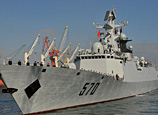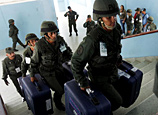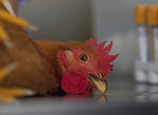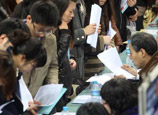
Carwashes, golf courts, ski slopes and bathing centers continue to threaten the capital's already-severe water crisis, according to an NGO report released on Thursday.
Beijing has over 5 million cars, more than any other city in China, according to the Beijing Traffic Management Bureau.
To keep cars clean given the capital's severe pollution and airborne dust, at least 6.5 million cubic meters of water are used every year, mostly tap water rather than re-treated water, Friends of Nature researchers said in their report.
"Among all the environmental risks the capital has encountered, the worst and most dangerous one is the shortage of water resources, but few people have sensed that," said Yang Dongping, director-general of Friends of Nature.
The city's naturally available per capita water resources have decreased from 325 cu m in 2002 to about 100 cu m in 2011, Xinhua News Agency reported previously.
The remaining demand must be satisfied by water from outside the city.
"Beijing has shown more unreasonableness and absurdity in its water consumption than many cities that don't lack water," said Zheng Yisheng, a researcher from the Institute of Quantitative and Technical Economics at the Chinese Academy of Social Sciences.
Hu Kanping, co-author of the report, said households are charged 4 yuan (65 cents) per cu m of tap water, while businesses like carwashes are charged more than 60 yuan per cu m.
However, some carwashes illegally use household tap water, which is still cheaper for the companies even if they are caught and fined, the report said.
Re-treated water costs only 1 yuan per cu m, but because the transport fee can be as high as 14 to 19 yuan per cu m, few carwashes use it, the report said.
It quoted a supplier of re-treated water in Beijing, who said that less than 0.1 percent of the re-treated water they provide every year is used by carwashes.
Difficulties extending pipes to the city center, which is already packed with underground pipes, has resulted in the high transport fee, the report said.
Hu suggested government should put carwashes next to bathing centers and rainwater utilization projects in the city to lower the transport fee.
Water: Big luxury users
Hu has worked on a series of studies that look into excessive water consumption by luxury industries in the capital.
The theme for 2013 is carwashes. Last year he focused on golf courses, and found that the 60 to 70 golf courses in Beijing are consuming as much as 40 million cu m of water every year, an amount that can sustain about 1 million people.
In 2011, Hu examined the ski industry in the capital, finding that at least 17 ski facilities are operating in the city, using at least 1 million cu m of water per year.
Before that he focused on the bathing industry - including hydrotherapy spas and hot-spring clubs - and found that the number of such facilities has increased from 39 in 1989 to more than 3,000 in 2010, with water consumption of a guest three to five times the daily amount used by an average person.
Latest development of H7N9 in China[Special]
















 Photo story: Nostalgia in a small telephone booth
Photo story: Nostalgia in a small telephone booth


![]()
